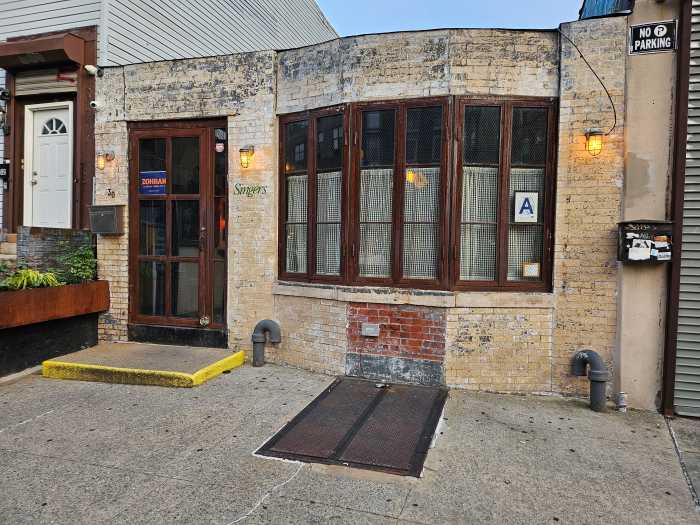In the days and weeks following Sept. 11,
pedestrians on Court Street passing the faces on the countless
"missing" posters taped to storefronts and lampposts
no doubt felt the same pain and bewilderment as does Horatio
as he walks among the bodies in the final scene of the Kings
County Shakespeare Company’s production of "Hamlet."
Like Horatio, the survivors of 9-11 still try to make sense of
the wasteful frenzy of human violence.
"Hamlet," on stage through Aug. 24, Shakespeare’s most
famous character grapples with the idea of avenging his father’s
death, and then his victim’s grieving family ponders avenging
their loved ones’ deaths, climaxing with the production’s carnage-filled
tableau.
By the time Hamlet is handed the rotted skull of the slain king’s
jester – his childhood playmate – it’s apparent that he has lost
both his innocence and his mirth. Both can be said of Brooklynites
after surviving Sept. 11. And while we pondered our choices –
striking back and leveling our enemies or turning the other freshly
tear-stained cheek – our dilemma was long ago made classic by
William Shakespeare.
Most importantly, the Bard also made a point to illustrate –
rather brutally – that when the choice is vengeance, the bodies
pile up exponentially. That may be why the company incorporated
"Hamlet" into its 18th season, dedicated to "plays
with themes of revenge and conscience – issues which are prominent
in all minds since 9/11."
The sparse set of KCSC’s production soon overflows with the cast,
decadently garbed by costume designer Rebecca Dowd. She must
be commended for her lush Edwardian-influenced costumes; even
the Greek costumes for the play-within-the-play are striking.
(The traveling players’ garb features togas topped with gorgeous,
macabre masks.) Dowd transforms actor Dan Snows, who took on
three roles including a humorous turn as the fencing judge, into
a powdered Oscar Wilde-like fop rather than a sober referee.
Director Jemma Alix Levy has the action naturally overflow the
two-tiered stage like water: actors run up the aisles behind
the audience and down the next aisle. A funeral procession arrives
from behind the audience, taking all by surprise – perhaps a
comment on how death can sneak up on us all.
Sean McNall, as Hamlet, gave a polished, nuanced performance.
He grieves, he teases and jokes and angrily grapples with his
mother’s remarriage – and with his mother. In McNall’s hands,
Hamlet’s plight is a sympathetic one with less emphasis on raving.
The only time McNall appeared at all forced is when he sat back
on his heels, staring up at the (invisible to the audience) ghost
of his father. He rears so far backward it seems like a cruel
abdominal exercise, rather than the posture of a conflicted son
who is both yearning for his father and at the same time fearful
of the apparition.
As Ophelia, Shannon Emerick – quite striking in her resemblance
to that other fair, blue-eyed actress Chloe Sevigny – gave a
gut-wrenching performance as she transformed from the sheltered,
devoted daughter into a grieving woman moaning, "Woe is
me." The audience is moved to tears by her performance –
made yet more palpable by the mournful songs of composer Aaron
Friedman.
Again Dowd deserves kudos, representing Ophelia’s loss of self
control in her garb: once seen with hair braided and in a demure,
high-collared black dress and boots, it’s a shock to see her
hair and undergarments – like her mind – literally come undone.
The audience doesn’t have a chance of remaining cold to the action
with the riveting, agonized performance of Deborah Wright Houston,
KCSC’s artistic director, as Hamlet’s worried mother Gertrude
attempting to console the inconsolable Ophelia.
As Gertrude grapples with Ophelia and with her son – both grieving
for their fathers – she radiates the helpless hurt of a mother.
Her suffering is acute as Hamlet accuses her, his mother, of
being the cause of his own suffering.
Houston is equally adept at playing the coquettish queen, lightheartedly
flirting at the court and stealing a kiss with her new husband,
Claudius, dashingly played by Cullen Wheeler.
Matt D’Amico as Horatio is the reliable foil to McNall’s mercurial
Hamlet, maintaining his bookish demeanor as the solemn voice
of reason.
The misery is tempered by the levity of Jeffrey Guyton, memorably
comic as the dapper courtier Polonius, the meddling father of
the tragic Ophelia and Laertes.
Alas, it’s necessary to rap Jane Titus – the Player Queen and
Gravedigger – on the knuckles for what could only be lack of
preparation. In both roles, she distractedly stumbled over her
lines.
Fight director Lucie Chin, as well as actors Masur and McNall,
creates a feast for the eyes and ears in the duel scene. Laertes
and Hamlet’s sharp rapiers whistle through the air during her
well-choreographed sword fight.
Levy’s non-traditional casting, including women taking on roles
historically designated for men, adds to the refreshing quality
of this interpretation of "Hamlet" without detracting
from the timeless, harrowing tale.
It certainly retains the power to give the audience pause in
these uncertain times, and even encourages us to cherish our
loved ones now more than ever.
Kings County Shakespeare Company’s production
of "Hamlet" runs through Aug. 24, Mondays and Wednesdays
through Saturdays at 8 pm, matinees on Saturdays at 1 pm and
Sundays at 2 pm. Final performance is Aug. 24 at 1 pm. (No evening
show.) Performances take place at Founders Hall, St. Francis
College, 182 Remsen St. between Court and Clinton streets. Admission
is $10. For tickets, call Smarttix (212) 206-1515 or visit www.smarttix.com.
There will be a panel discussion, "Hamlet Post 9/11: Conscience
and Revenge" on Aug. 18 featuring several Shakespearean
scholars including William Heller of New York University, Brother
Edward Wesley of St. Francis College and Dick Riley, who co-authored
"Bedside, Bathtub and Armchair Companion to Shakespeare."

























